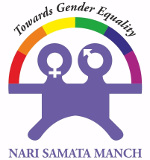
International Women’s Year (1975) and International Women’s Decade (1976-1985) led to increasing feminist consciousness on gender based subordination and violence. This context gave impetus to formation of autonomous women’s collectives. Nari Samata Manch (henceforth mentioned as ‘Manch’) is one such early collective which started working informally on the issue of gender based violence. The nature of work was of intervention in the complaints of domestic violence through providing opportunity to speak out, making visits to complainants’ homes, assisting them for filing and pursuing police complaints if required and so on. Soon it was realized that just helping women would not be enough, but creating awareness and sensitizing men along with women was necessary. This led to conducting awareness campaigns on the issue of gender based violence to sensitize women and men.
The value of ‘Equality’ is rooted in the very name of ‘Nari Samata Manch’. While addressing, confronting and preventing domestic violence was the starting point, canvass of work done by Manch over the years expanded to other situations involving gender based violence such as assaults on young women declining demand for ‘love’ by young men due to one sided attraction as well as sexual harassment of women at workplace.
Considering ‘Gender’ as a basic category, we try to analyse gender realities in different relationships. We felt the need to expand gender analysis, which encompasses patriarchy as a major determinant for discrimination, to other human relationships in all social structures and institutions. In this mission, we consider marginalized people as our allies and hence expanded our work with rural and tribal communities. Thus, our work in the rural and tribal areas covers education, health and water supply as some of the focus areas which, in the long run, contributes to sensitisation towards and prevention of gender-based violence.
Similarly, considering importance of intervention in democratic institutions, we work with the approach of gender integration in local self-government units. The journey is on for the last 40+ years, with Manch maintaining itself as an integral part of the broader social, progressive movements.
